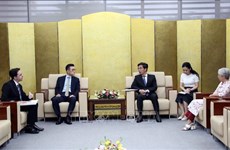Dialogue focusses on improving jobs for female workforce
The Vietnam General Confederation of Labour and the ASEAN Services
Employees Trade Union Council (ASETUC) of Vietnam held a national social
dialogue on September 25 highlighting the efforts undertaken to
increase jobs for female workers in Vietnam and ASEAN.
The Vietnam General Confederation of Labour and the ASEAN Services
Employees Trade Union Council (ASETUC) of Vietnam held a national social
dialogue on September 25 highlighting the efforts undertaken to
increase jobs for female workers in Vietnam and ASEAN.
The dialogue aimed to discuss the impacts of ASEAN economic integration on female workers in Vietnam and the region, whilst reviewing cooperation efforts and the engagement of national and regional partners in providing jobs for women.
Participants discussed safety and hygiene measures in the workplace, social support policies and professional skills development for female labourers.
Marina Christina, ASETUC’s Project Coordinator, highlighted the potential negative impacts of ASEAN economic integration in 2015 on female labour, including a lower ratio of female workers in highly-skilled jobs and positions of leadership, as well as a higher proportion of females in non-professional and insecure jobs.
At the same time, unemployment is higher amongst females, while wages are lower than their male counterparts’ wages, even in the same job position, she noted.
Gender inequality was still rife in terms of recruitment, education and appointment, she said, adding that many women working in hazardous environments had yet to receive proper support and those living in remote areas had poor access to health care services.
According to Marina , the opinions gathered during the dialogue would help ASETUC make concrete proposals to ASEAN to boost women’s access to education, training, and health care services.
National legal procedures against gender discrimination need to be strengthened and policy frameworks on labour and employment need to be completed in a bid to secure sustainable jobs for workers, especially women, she stressed.
Since 2007, ASETUC has focused on increasing social dialogues as a means to ensure employment in the ASEAN integration process.
The council organised a number of dialogues in Vietnam , Indonesia , Malaysia and Cambodia , with different topics according to ASETUC’s priorities for each country.-VNA
The dialogue aimed to discuss the impacts of ASEAN economic integration on female workers in Vietnam and the region, whilst reviewing cooperation efforts and the engagement of national and regional partners in providing jobs for women.
Participants discussed safety and hygiene measures in the workplace, social support policies and professional skills development for female labourers.
Marina Christina, ASETUC’s Project Coordinator, highlighted the potential negative impacts of ASEAN economic integration in 2015 on female labour, including a lower ratio of female workers in highly-skilled jobs and positions of leadership, as well as a higher proportion of females in non-professional and insecure jobs.
At the same time, unemployment is higher amongst females, while wages are lower than their male counterparts’ wages, even in the same job position, she noted.
Gender inequality was still rife in terms of recruitment, education and appointment, she said, adding that many women working in hazardous environments had yet to receive proper support and those living in remote areas had poor access to health care services.
According to Marina , the opinions gathered during the dialogue would help ASETUC make concrete proposals to ASEAN to boost women’s access to education, training, and health care services.
National legal procedures against gender discrimination need to be strengthened and policy frameworks on labour and employment need to be completed in a bid to secure sustainable jobs for workers, especially women, she stressed.
Since 2007, ASETUC has focused on increasing social dialogues as a means to ensure employment in the ASEAN integration process.
The council organised a number of dialogues in Vietnam , Indonesia , Malaysia and Cambodia , with different topics according to ASETUC’s priorities for each country.-VNA













